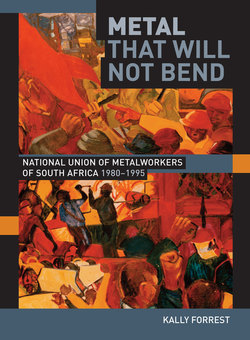Metal that Will not Bend

Реклама. ООО «ЛитРес», ИНН: 7719571260.
Оглавление
Kally Forrest. Metal that Will not Bend
Contents
Acknowledgements
LIST OF ABBREVIATIONS AND ACRONYMS
Introduction
Chapter One. Building local power: 1970s
The 1970s: new light
Independent: Metal and Allied Workers Union
Tucsa dissidents: Numarwosa, UAW, WPMawu, Eawu
In Tucsa: Motor Industry Combined Workers Union
Unity and organisational space
Chapter Two. Power through numbers: 1980–1985
Mawu and migrant workers
Exploiting Wiehahn laws
To register or not
Growth and organisation
Shop stewards councils emerge
Education and union growth
Chapter Three. Power in unity: 1980–1987
National auto union
National metal union
Coming of age
Chapter Four. Breaking the apartheid mould: 1980–1982
The great strike: Volkswagen 1980
Pension strike wave
East Rand strike wave
Turning point
Pyrrhic victory?
Chapter Five. Worker action fans out: 1980–1984
Auto expansion
Expansion in metal engineering
Expansion into northern Natal
Eastern Transvaal setback
Expansion into Brits
Moving into homelands
Chapter Six. Melding institutional, campaign and bureaucratic power: 1983–1990
Outgrowing capacity
Early demands
Alliances for a living wage
Power through all-level bargaining
Building bureaucratic power
Chapter Seven. Conquest of Metal Industrial Council: 1987–1988
1988: Seizing council power
Build up to industry strike
National company councils
The 1988 strike
Chapter Eight. Auto workers take power: 1982–1989
Living wage in assembly
Numsa 1987: power in auto
Mercedes strike: 1987
Restructuring bargaining 1988–1989
One bargaining platform, one union
National bargaining forum
Chapter Nine. Auto takes on the industry: 1990–1992
Progress and revolt: 1990
NBF bargaining, 1990: non-wage successes
Revolt at Mercedes
Wages and retrenchment 1991–1992
Employers reassert control
Chapter Ten. New directions: 1988–1991
War at plants
Developing alternative vision
Union think-tanks
Chapter Eleven. Defeat of Mawu strategy: 1990–1992
Shifting bargaining agenda: 1990–1992
1992: year of promise and disaster
The strike fallout
Chapter Twelve. Towards a new industry: 1993
Debating restructuring
Training for transformation
New bargaining programme
Chapter Thirteen. The Cinderella sector: 1983–1990
Background to motor sector
The great deadlock
Breaking the deadlock
Chapter Fourteen. Applying vision in auto and motor: 1990–1995
Negotiating change in motor
Bargaining change in auto: 1993
Bargaining change in 1994
Negotiating change in 1995
Dangers for workers
Chapter Fifteen. Applying vision in engineering: 1994–1995
Leadership and organisational weakness
Democratising the workplace
Return to workers’ control
Missed opportunity
Chapter Sixteen. Independent worker movement: 1980–1986
Sticky question of alliances
British Leyland strike
Debating alliances
Pursuing independent politics
Chapter Seventeen. Beginnings of alliance politics: 1984–1986
Divisions in Mawu
Forging alliances: 1984 stayaway
Uneven political responses
Transitional politics
Chapter Eighteen. Weakening the socialist impulse; civil war in Natal: 1987–1994
Uneasy truce: Fosatu and Inkatha
BTR Sarmcol: the trigger
Unionists under attack
Workers and communities divided
Union response to violence
Union culpability?
Chapter Nineteen. Civil war in Transvaal: 1989–1994
Numsa targeted
Peace initiatives
Unitary vision breaks up
Lack of unified vision
Chapter Twenty. New politics: 1987–1990
Freedom Charter: contested terrain
Contestation and consensus: 1986–1989
Politics of campaigns
LRA campaign
Chapter Twenty-One. Disinvestment: pragmatic politics 1985–1989
Negotiating disinvestment
Disinvestment: bargaining weapon
Chapter Twenty-Two. Compromising on socialism: Legacy of the Alliance 1989–1995
Forging alliances
Maxwell Xulu: independent Marxist?
Alliance: complex proposition
Inserting worker perspective
Shaping economic reform
Influencing policy: reconstruction accord
A vision diluted
Conclusion
Theories of trade union power
Notes
SELECT BIBLIOGRAPHY
Index. A
B
C
D
E
F
G
H
I
J
K
L
M
N
O
P
Q
R
S
T
U
V
W
X
Y
Z
Отрывок из книги
METAL THAT WILL NOT BEND
National Union of Metalworkers of South Africa 1980–1995
.....
Numarwosa first decided to approach Africans in late 1972, while it was still in Tucsa. To circumvent the law, it used the tactical device of forming UAW as a parallel to the white and coloured unions which were covered by industrial relations laws, but with amalgamation into one union as the long-term aim. In Tucsa, parallel coloured and African union leaders were appointed by the white union executive and they were neither developed nor encouraged as trade unionists. In a break from this practice, UAW’s members elected leaders to an independent executive and sat with Numarwosa on a joint advisory committee.47 It is not often acknowledged that the independent UTP (Urban Training Project) associated with Tucsa also played a role in UAW’s early formation. Numarwosa and UTP assisted in the launch of UAW, and in 1975 UTP helped to establish a Pretoria branch and trained Dorah Nowatha to become an organiser. A UTP organiser, Michael Faya, became UAW’s first national secretary in 1974.48
UAW struggled to survive in its early years and organising Africans was a slow and secretive business. Workers were fearful, and union resources meagre. Yet beneath Africans’ cautious facade lay long-standing grievances, particularly around racial discrimination and unfair dismissal. The foremen’s sweeping powers included granting leave, giving permission to use toilets and decisions on wage increases, retrenchments and dismissals. An industrial relations director at General Motors joked: ‘The biggest optimist in the workforce was the guy who brought his sandwiches to work, because he had no assurance that he’d still be there at lunch time.’49 Formal complaints and appeal procedures were unheard of.
.....